Honoring the First Black Mayor of Detroit
Published on February 23, 2024 in Partners
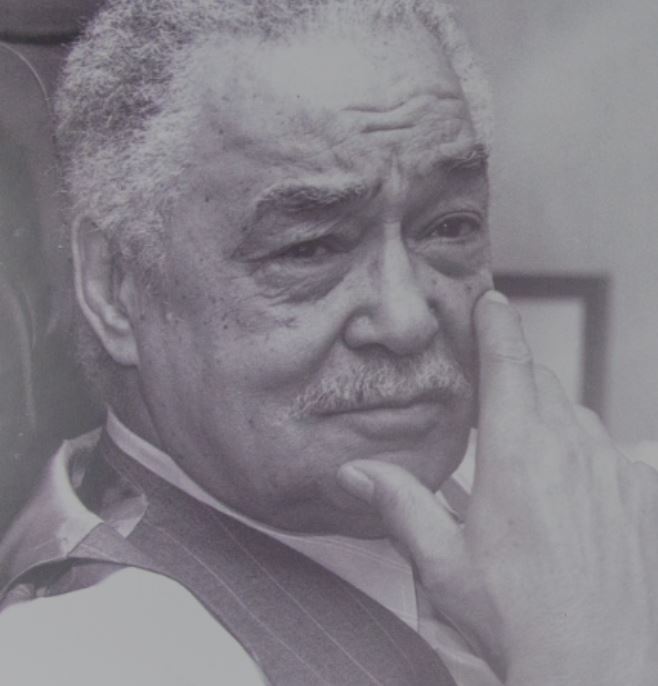
As the first Black mayor of Detroit, Coleman A. Young’s impact on the city is undeniable. Mayor Young integrated city offices and set the foundation for the development of a thriving entertainment district in the heart of the city. His love for Detroit led him to five terms as Detroit’s longest-serving mayor.
“When it comes to Mayor Young, it’s very important for people to understand that there was Detroit BC (Before Coleman) and AC (After Coleman),” said Khary K. Turner, MAED, executive director at Coleman A. Young Foundation (CAYF). “The truth is before Mayor Young, our police force did not reflect the community it served, neither did our fire department, nor our city’s legal department.”
In the wake of the 1967 Detroit riots, Mayor Young campaigned that he would work to end police brutality and vowed to integrate the police force. In 1973, he won and did just that.
“If he did nothing else, Mayor Young made sure that city government looked like the people it served,” said Khary. “All city services were always 50% black, 50% white with at least 30% women being placed in roles to impact the people of Detroit.”
Between 1975 and 1982, the number of Detroit police brutality complaints decreased from 2,323 to 825. The New York Times attributes this reduction to Mayor Coleman’s reform measures.
Mayor Young had a vision for Detroit and laid the foundation for a walkable downtown entertainment district.
“Mayor Young worked with Mike Ilitch to lay the groundwork for Little Caesars Arena, Ford Field and, Comerica Park, by first resurrecting the Fox Theater,” Khary said. “Mayor Young helped to plant the seed for the only entertainment district in the US that has three major stadiums within two blocks of each other. A truly walkable sports and entertainment complex.”
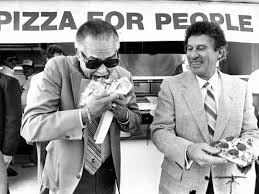
CELEBRATING THE SPIRIT OF DETROIT
Mayor Young was not only worried about racial struggles or the development of infrastructure, but also valued education and opportunity. Mayor Young wanted to make sure that long after he was gone, Detroit students were well supported with higher education and equal opportunities for success.
To support the students of Detroit, Mayor Young started CAYF in 1982. Its original mission was to provide financial support and mentor young Detroiters who seek a college education.
Since it began, the foundation has awarded more than $4 million to over 450 students. Annually, CAYF awards up to eight scholarships and serves 150 students through Real Skills – a 26-week program for sixth through 12th graders that offers higher education preparation, career assistance, financial workshops and more.
“Mayor Young wore his love for the city on his sleeve,” Khary said. “He was a leader willing to advocate for the city in a time of white flight and widespread divestment. He went to bat for us in a time that lacked belief in Detroit’s people.”
The foundation has achieved an unprecedented 90% graduation rate and 60% return rate to Detroit. The scholars are encouraged to pour back into Detroit’s ecosystem and better the community.
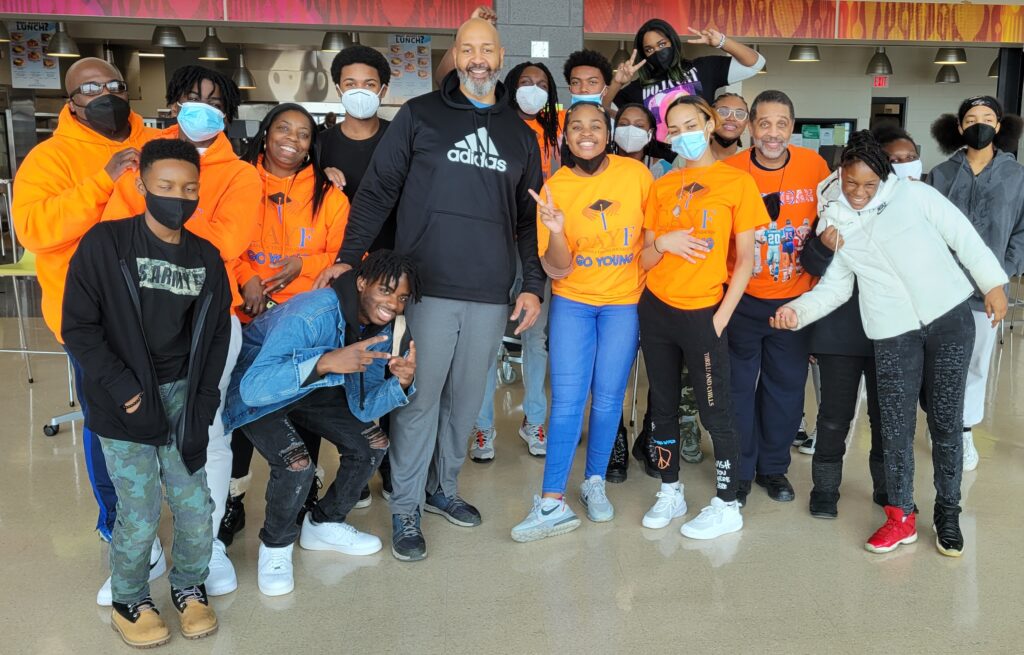
“I’m a Detroiter, born and raised,” said Khary. “There is no one on the planet quite like a Detroiter. We’re fiercely about that defiant life—and people with that spirit need to be empowered through education and professional access.”
According to the 2019 ALICE Report, 69% of households in Detroit are struggling to make ends meet.
“Detroit is full of young people walking around with 2.8 GPAs that would be 3.8 GPAs, if they didn’t have to climb mountains,” said Khary. “They are strengthened by their strife. When you overcome those experiences as a teen, it steels you.”
RACIAL EQUITY FUND HELPS SCHOLARS TOUR COLLEGES
This year, CAYF received a grant from United Way for Southeastern Michigan’s Racial Equity Fund. The Racial Equity Fund provides financial support and technical assistance to BIPOC-led organizations, empowering them to work towards racial justice.
“I’m deeply appreciative of United Way for Southeastern Michigan for recognizing those of us who are still doing the work,” said Khary. “There’s no rule that says anyone has to acknowledge your position and the work you are doing so I’m really honored.”
Since 2022, the REF has awarded $3 million to 77 organizations. Read more about United Way’s commitment to Diversity, Equity and Inclusion (DEI) on our website.
“I’m concerned that now being a few years removed from the Black Lives Matter summer, the lens placed on DEI is starting to shift away,” Khary said. “We’re starting to see now who is really serious.”
“By virtue of this fund, United Way has shown that it’s serious about this ongoing conversation.”
With the REF grant, CAYF plans to take more students on college tours across Michigan and to HBCU’s within reach.
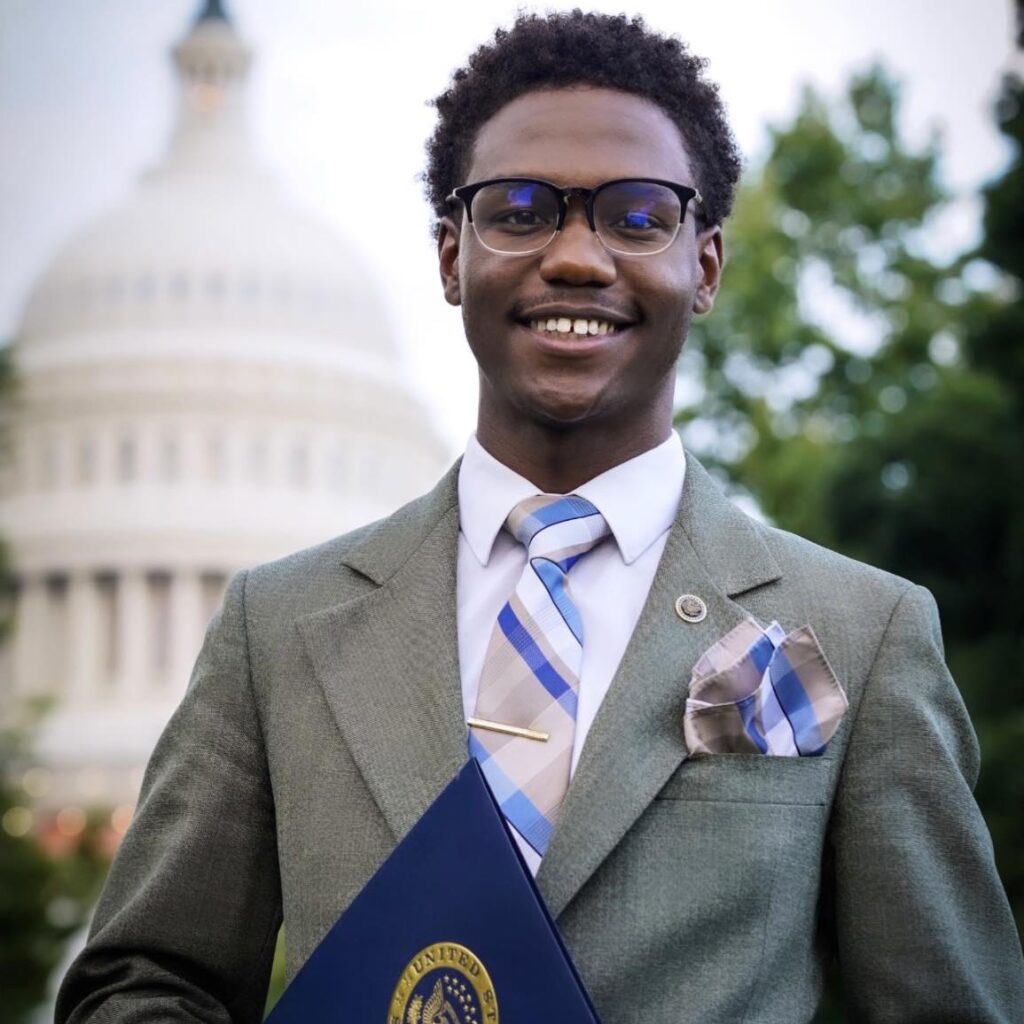
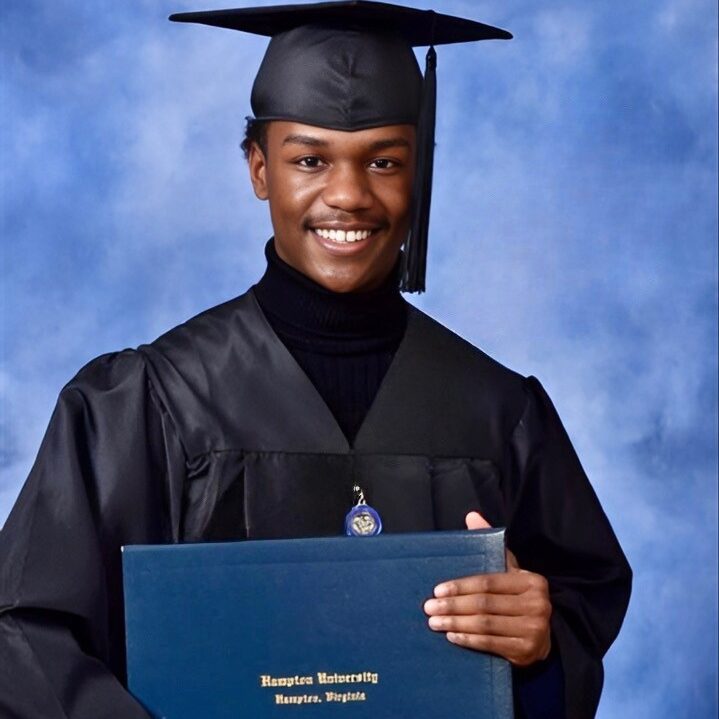
“On every tour, a kid starts the day saying, ‘I don’t see myself going to college.’” said Khary. “And the day ends with the same kid saying, ‘You know, what? Let me think twice about it.’”
Walking around the campus, students see the value of a college experience and want to join in. They learn that college is not only a place for academic and professional growth, but an opportunity for personal development.
“Higher education gives them a chance to go away and be independent. You need the freedom to learn from your own successes and missteps,” said Khary. “It’s not just about what college prepares you to do professionally. College prepares you for life.”
One of the goals at CAYF is to shrink the world for their scholars. If they see the world as accessible, there’s a higher likelihood that they will explore it. Currently, 27 scholars are on campus being mentored and supported by the wrap around services of CAYF.
SUCCESSFUL SCHOLARS
CAYF scholars have already positively impacted the fabric of Detroit. The largest running club in the State of Michigan, We Run 313, was co-founded by CAYF alumnus Lance Woods.
“I remember when Lance was running almost 10-minute miles and now he’s a sub-3 hour marathoner running an organization with more than 5,000 members, sponsored by ASICS,” said Khary. “History is written by winners and participants.”
“We are helping so many young people become participants.”
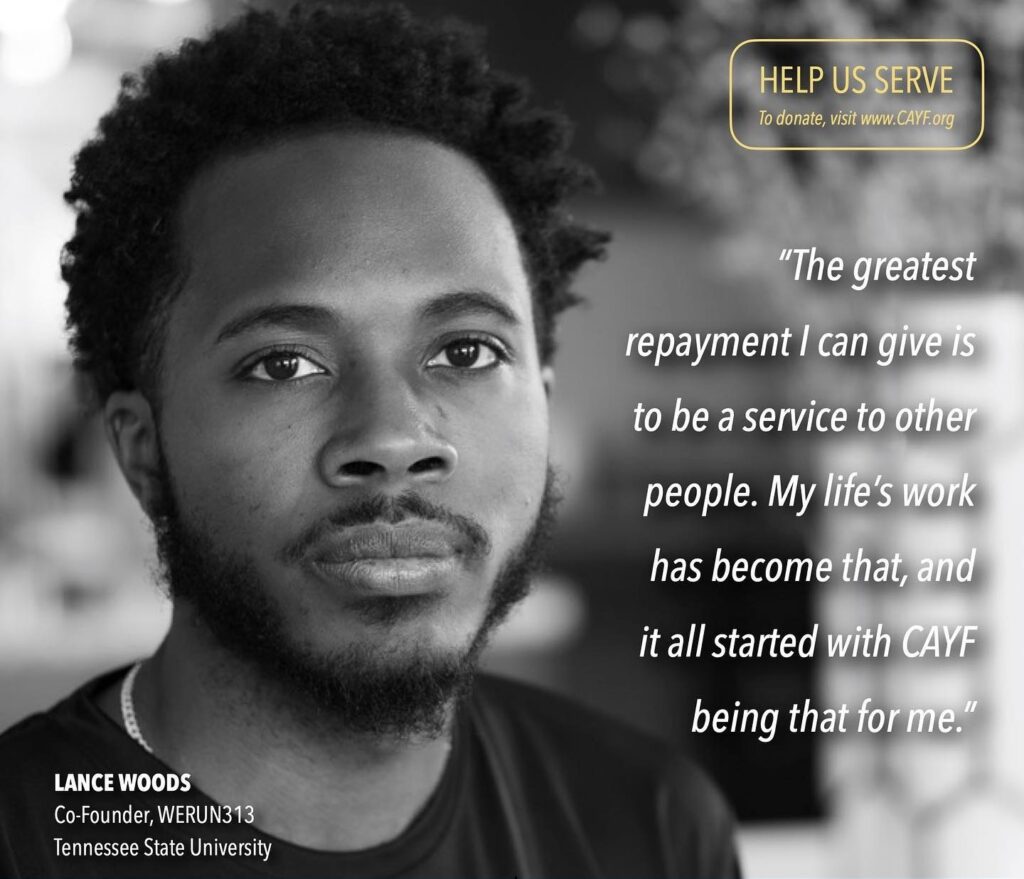
Many CAYF alums have gone on to do great things. Alumna Shawnita Sealy-Jefferson, PhD, MPH, is an associate professor of Epidemiology at Ohio State University. Her nine publications explore the many root causes of shorter BIPOC lifespans due to various aspects of urban living.
“Dr. Shawnita Sealy Jefferson is incredible, and she deserves to be mentioned,” said Khary. “Her research helps the foundation do what we do better.”
Another alum, Nahida Lagu, graduated from the University of Detroit Mercy Nursing School and stayed in the city as a registered nurse in neonatal intensive care. Other scholars have accepted opportunities to do important work across the nation. Alumna Tia Gee graduated from Michigan State University and started one of the first Black owned beauty supply stores in the Dallas Fort-Worth area of Texas.
“Tia was one of my scholars, she has an entrepreneurial heart and a broker’s mindset—a great negotiator,” said Khary. “I’m particularly proud of her because she had a rocky start to her life, she grew out of a transient childhood.”
“Our founder, Mayor Young charged this organization to find people like Tia, Nahida, Shawnita and Lance, and figure out how to help them.”
PAYING IT FORWARD
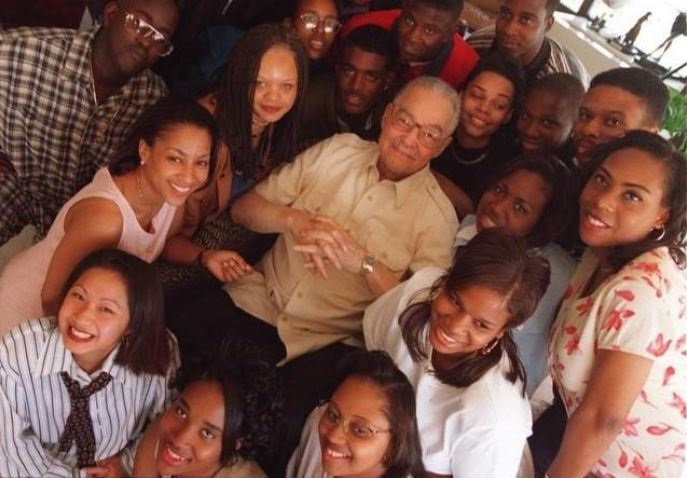
In 2025, a statue of Mayor Young will be placed in the Statuary Hall in Washington, DC alongside Rosa Parks, Fredrick Douglas and Mary McLeod Bethune.
“The statue is the beginning,” Khary said. “It’s an opportunity to tell Mayor Young’s story— a Detroit story.”
“I’d love to see Detroit reinserted into a national conversation about Mayor Young’s rightful place, not just in politics, but also in civil and human rights.”
Mayor Young broke barriers and he will be remembered for his dedication to the people of Detroit. By following in his footsteps, CAYF is making history every day.
“We’re paying Black History Month forward, adding to the pantheon,” said Khary. “I love planting seeds with our scholars, looking them up ten years from now and saying, ‘Wow, you’re making history.’”
CAYF carries out Mayor Young’s legacy of love through support that transforms lives. Every transformed life begins to transform Detroit itself.
“I’m able to see Detroit youth become men and women, husbands and wives, professionals and executives,” said Khary. “They shift societies, and they become the grout of the city. And that’s what gives me real joy, I’m able to watch their path.”
To donate to the Racial Equity Fund and other DEI Initiatives, click the button below.